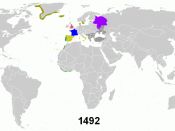"The loss of national identity is the greatest defeat a nation can know, and it is inevitable under the contemporary form of colonization" (Miloà ¡eviàS, 2000). Former Serbian president, Slobodan Miloà ¡eviàwas correct to an extent. However, he failed to explain that the contemporary form of colonization has a far greater consequence than the loss of national identity. In contemporary colonization, there is a loss of hope due to the shortage of jobs, loss of economic stability due to the devaluation of currency and loss of opportunity due to free trade agreements imposed by the International Monetary Fund. International financial organizations such as the World Bank and International Monetary Fund have placed various stipulations on the third world because of globalization. These stipulations keep many countries in South America, the Caribbean and Africa subordinated to their former colonizers, thus, exposing globalization for what it really is - contemporary colonization. This essay will evaluate the consequences of colonization and globalization in the third world.
I will begin by providing a summary on what colonization and globalization is. By doing this, I will highlight the benefits and drawbacks of each system. I will also explain how western nations use globalization to force economic dependency through financial institutions, and lastly, I will recommend solutions to solving the problems created by contemporary colonization in the third world. Essentially, this essay will argue that globalization is a contemporary form of colonization and thus, hinders third world autonomy and forces economic dependency to the western world.
In western civilization, the concept of colonization rarely appears outside of history books, yet, it has a profound impact on the world and culture we live in. In its most basic form, colonization occurs when a group of people claim ownership of a territory or land already occupied by another...


